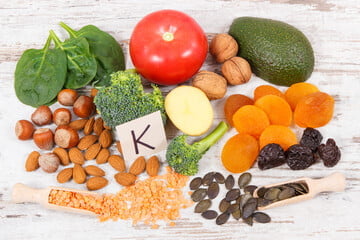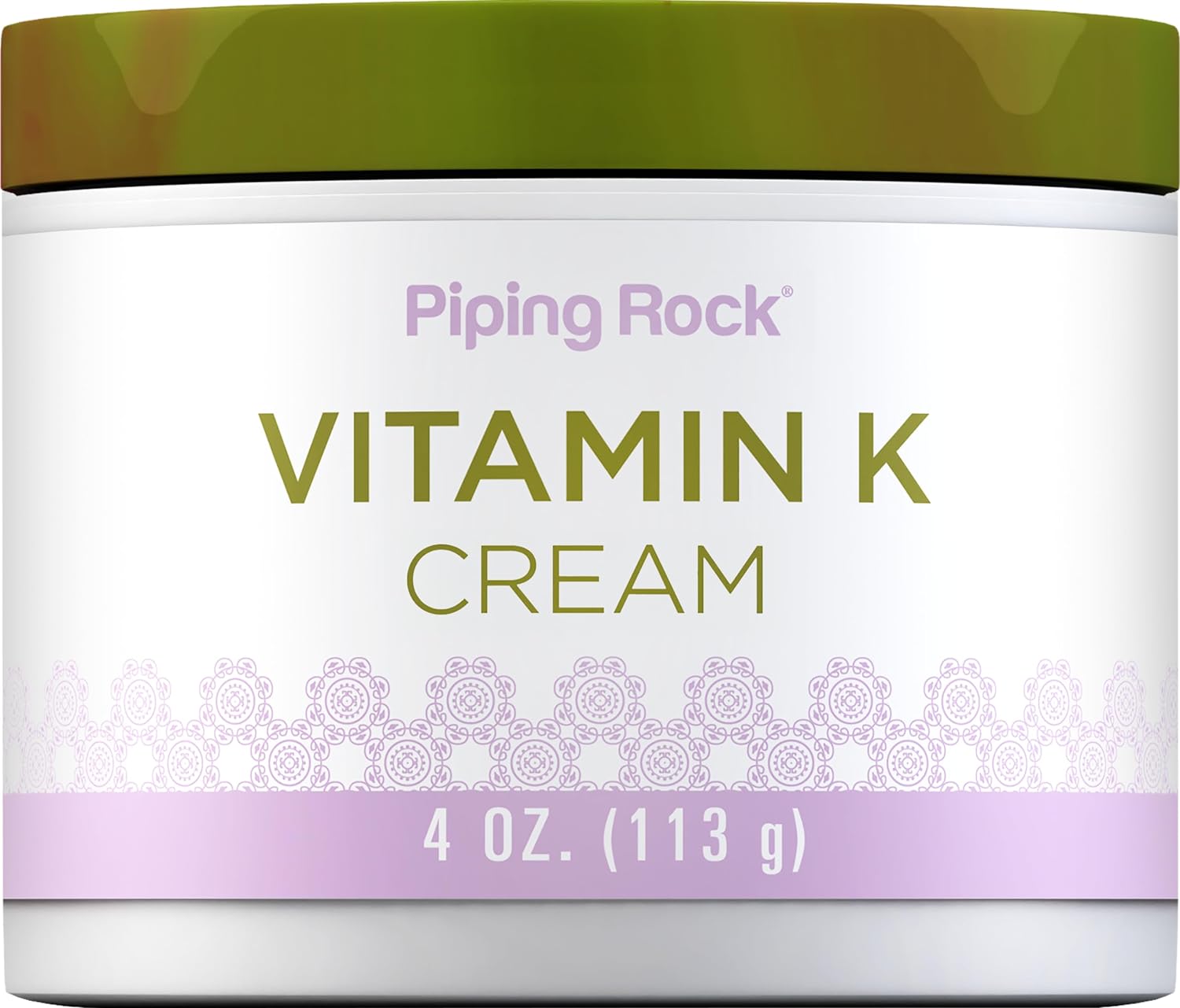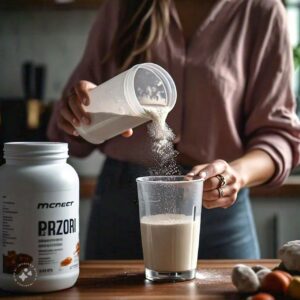One powerful component that has been making presents in the skincare industry for its amazing advantages is vitamin K. Not only is important for healthy bones and blood clotting, but vitamin K cream has also made its way into the cosmetics market. We will examine the many facets that vitamin in this general guide, including its name, benefits, deficiency, food sources, and the exciting world of vitamin K cream.
Vitamin K Name
A fat-soluble vitamin, owes its name to the German word “Koagulation,” highlighting its important role in blood clotting. There are two primary forms of K Vitamin – K1 (phylloquinone) and K2 (menaquinone). While K1 is mainly found in leafy green vegetables, K2 is produced by bacteria in the human gut and is present in fermented foods.
Benefits
1. Blood Clotting
That Vitamin primary claim to fame lies in its role in blood clotting. It facilitates the production of proteins responsible for proper coagulation, preventing excessive bleeding and ensuring wound healing.
2. Bone Health
Beyond its clotting prowess, also contributes significantly to bone health. It helps in the regulation of calcium, preventing it from collecting in blood vessels and soft tissues while promoting its deposition in bones, thereby enhancing bone density.
Vitamin K Deficiency
A deficiency in K Vitamin can lead to numerous health issues, primarily affecting blood clotting and bone metabolism. Common causes include a poor diet, certain medical conditions, and the use of antibiotics that disrupt gut bacteria responsible for synthesizing that Vitamin.
Vitamin K Foods
Ensuring an sufficient intake of K Vitamin through a well-balanced diet is necessary. Include the following foods into your meals:
- Leafy Greens: Kale, spinach, collard greens
- Cruciferous Vegetables: Broccoli, Brussels sprouts, cabbage
- Herbs: Parsley, basil, thyme
Deficiency Symptoms
Recognizing deficiency is important for timely mediation. Look out for the following symptoms:
- Easy Bruising
- Excessive Bleeding
- Heavy Menstrual Bleeding
- Weak Bones and Fractures
Supplements
In cases where dietary intake is inadequate or absorption is compromised, Vitamin supplements may be recommended. However, it’s necessary to consult with a healthcare professional before starting any supplementation.
Vitamin K Cream
1. Introduction to Vitamin K Cream
It can decrease skin discolouration and boost more even skin tone led to its introduction into the beauty industry. Due to its potential benefits for skincare, vitamin K cream which is frequently combined with other healthy ingredients is becoming more and more popular.
2. Benefits of Vitamin K Cream for Skin
- Reduction of Dark Circles: Vitamin K cream is believed to diminish the appearance of dark circles under the eyes by improving blood circulation and reducing the visibility of blood vessels.
- Minimization of Bruises and Scars: The anti-inflammatory properties of that vitamin contribute to faster healing, minimizing the appearance of bruises and scars.
- Management of Spider Veins: It is role in improving blood flow may help decrease the appearance of spider veins and broken capillaries.
Functions
It’s function extends beyond blood clotting and skincare. It is involved in different physiological processes, including:
- Cell Growth Regulation: It is plays a role in cell growth regulation, contributing to overall tissue health.
- Anti-Inflammatory Effects: Its anti-inflammatory properties help combat inflammation and promote healing.
Vitamin K2
While K1 vitamin is abundant in leafy greens, K2 vitamin is found in fermented foods and certain animal products. K2 is gaining attention for its potential cardiovascular benefits and its role in calcium metabolism.
Food Sources
Make sure a well-rounded diet by including these rich foods:
- Fermented Foods: Natto, sauerkraut, fermented cheeses
- Meat: Beef, pork, chicken liver
- Dairy: Cheese, eggs
Vitamin K Eye Cream
Additional care should be used with the pale skin surrounding the eyes. Vitamin K Eye Cream are designed to tackle particular issues, such as puffiness and dark circles.
Side Effects
While vitamin k is generally safe when obtained through diet, excessive supplementation may lead to side effects. These can include:
- Interference with Blood-Thinning Medications: It can interfere with the action of blood-thinning medications, so it’s important to maintain a consistent intake.
- Allergic Reactions: Some individuals may experience allergic reactions to that vitamin supplements or topical products.
Rich Foods
Try new foods that are high with vitamin k to broaden your palate:
- Japanese Natto: Fermented soybeans
- Swiss Cheese: A flavorful source of Vitamin K2
- Blueberries: A fruit option with moderate content
Vitamin K for Newborns
To prevent that vitamin deficient bleeding (VKDB), an uncommon but deadly bleeding disease, newborns are frequently given a vitamin K shot soon after birth. By taking this precaution, you may make sure the baby has enough vitamin to coagulate blood
Vitamin K Shot
Newborns take a Vitamin K injection, which contains K1vitamin, which offers instant protection against VKDB. Although some parents find the shot controversial, it is a routine procedure that medical professionals support to protect newborns’ health.
Summary
As an all-around useful and important nutrient, that vitamin use as wallow in the cosmetics industry with products like vitamin K cream. It also helps with blood coagulation and bone health. It is a testament to the complex relationships between nutrition and general health, as evidenced by its many forms, benefits, sources, and involvement in the health of newborns. For a more vibrant and healthy you, embrace the power of vitamin k in your life on the inside as well as the outside.
DAILY INTAKE
Certainly! Here’s a general guideline for daily intake based on age and gender:
| Age Group | Male (mcg/day) | Female (mcg/day) |
|---|---|---|
| 0-6 months | 2.0 | 2.0 |
| 7-12 months | 2.5 | 2.5 |
| 1-3 years | 30 | 30 |
| 4-8 years | 55 | 55 |
| 9-13 years | 60 | 60 |
| 14-18 years | 75 | 75 |
| 19+ years | 120 | 90 |
Individual needs may differ, thus it is necessary to remember that and to always seek the guidance of a healthcare provider for specific recommendations. Furthermore, a variety of foods, such as broccoli, Brussels sprouts, leafy green vegetables, and some oils, can be consumed to receive K vitamin.
FAQS
1. what is vitamin k cream good for?
Vitamin K cream is beneficial for promoting skin healing and reducing the appearance of bruises and dark circles under the eyes.
2. How vitamin k help in blood clotting?
Vitamin K plays a crucial role in blood clotting by assisting in the production of several proteins necessary for coagulation, such as prothrombin.
3. Why vitamin k for newborn?
Newborns are often given vitamin K injections at birth to prevent a rare but serious bleeding disorder called vitamin K deficiency bleeding, which can occur due to low levels of vitamin K in newborns.
4. What vitamin K supplements is necessary?
Vitamin K supplements may be necessary for individuals with certain medical conditions or deficiencies, but most people obtain sufficient vitamin K from their diet, particularly from green leafy vegetables like kale and spinach.
5. Where vitamin K is fund?
Vitamin K is found in various food sources, including green leafy vegetables, such as kale, spinach, and broccoli, as well as in some animal products like liver and eggs.
6. Which vitamin K is best for skin?
For skin applications, vitamin K1 is often considered the best option due to its role in promoting skin healing and reducing the appearance of bruises and dark circles.




